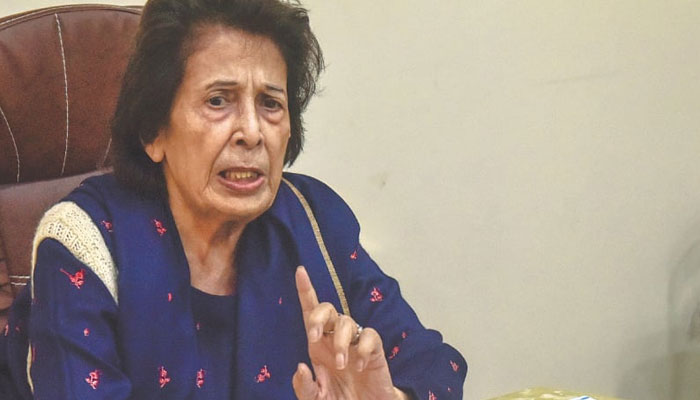Sindh govt’s eight commissions plan to meet challenges through collaboration
Since several commissions established by the Sindh government enjoy different powers and functions under their respective laws, there is an immense need for developing an information-sharing and complaint referral mechanisms, as well as for improving the performance of the commissions and focusing on other areas of cooperation deemed necessary to ensure effective service delivery.
This was the main crux of a consultative meeting attended by representatives of eight commissions at a hotel in Karachi on Friday.
The Sindh Human Rights Commission (SHRC) organised the meeting, which was attended by representatives from the National Commission for Human Rights, the Sindh Information Commission, the Provincial Public Safety and Police Complaints Commission, the Commission for Sindh HIV/Aids Control Treatment and Protection, Sindh Commission on the Status of Women, Sindh Health Care Commission and Commission Against Harassment at Workplace.
Zulifqar Shah, an SHRC member, was the moderator. Justice (retd) Majida Razvi, the SHRC chairperson, said that the main objective of the meeting was the future collaborations among the various commissions. “The mandates of all commissions are interlinked with each other and in one way or another they are overlapping,” she said. “The meeting will help us in understanding not only their mandates but also challenges, which will be very helpful in future joint endeavors.”
Murtaza Wahab, adviser on law, environment and climate change and coastal development, praised the SHRC for gathering representatives of all commissions to share their roles and responsibilities and scope of work.
“Such types of interventions will help the government. Issues could be resolved through dialogues that will help in creating in a healthy society,” he said. “Commissions should work autonomously as they are autonomous bodies,” he said.
Wahab said that the government had posted laws on its website in Urdu so that people could easily access them.
Shahid Gulzar Shaikh, chief commissioner of the Right to Information Commission, shared the challenges the commission faced and said that the government did not appoint the designated officers, and, because of it, the commission that was formed in May 2018 was not able to give information to the citizens.
“Article 19-A provides to the citizens the right to information and transparency. The right to information is the fundamental right of the citizen,” he said.
Other speakers included Anis Haroon, former member of the National Commission for Human Rights, Justice (retd) Shah Nawaz Tariq, the ombudsman for the Commission Against Harassment at the Workplace, Nuzhat Shirin, chairperson of the Sindh Commission on the Status of Women, and Sikandar Memon, provincial manager, Enhanced HIV/AIDS Control Program.
-
 Garrett Morris Raves About His '2 Broke Girls' Co-star Jennifer Coolidge
Garrett Morris Raves About His '2 Broke Girls' Co-star Jennifer Coolidge -
 Winter Olympics 2026: When & Where To Watch The Iconic Ice Dance ?
Winter Olympics 2026: When & Where To Watch The Iconic Ice Dance ? -
 Melissa Joan Hart Reflects On Social Challenges As A Child Actor
Melissa Joan Hart Reflects On Social Challenges As A Child Actor -
 'Gossip Girl' Star Reveals Why She'll Never Return To Acting
'Gossip Girl' Star Reveals Why She'll Never Return To Acting -
 Chicago Child, 8, Dead After 'months Of Abuse, Starvation', Two Arrested
Chicago Child, 8, Dead After 'months Of Abuse, Starvation', Two Arrested -
 Travis Kelce's True Feelings About Taylor Swift's Pal Ryan Reynolds Revealed
Travis Kelce's True Feelings About Taylor Swift's Pal Ryan Reynolds Revealed -
 Michael Keaton Recalls Working With Catherine O'Hara In 'Beetlejuice'
Michael Keaton Recalls Working With Catherine O'Hara In 'Beetlejuice' -
 King Charles, Princess Anne, Prince Edward Still Shield Andrew From Police
King Charles, Princess Anne, Prince Edward Still Shield Andrew From Police -
 Anthropic Targets OpenAI Ads With New Claude Homepage Messaging
Anthropic Targets OpenAI Ads With New Claude Homepage Messaging -
 US Set To Block Chinese Software From Smart And Connected Cars
US Set To Block Chinese Software From Smart And Connected Cars -
 Carmen Electra Says THIS Taught Her Romance
Carmen Electra Says THIS Taught Her Romance -
 Leonardo DiCaprio's Co-star Reflects On His Viral Moment At Golden Globes
Leonardo DiCaprio's Co-star Reflects On His Viral Moment At Golden Globes -
 SpaceX Pivots From Mars Plans To Prioritize 2027 Moon Landing
SpaceX Pivots From Mars Plans To Prioritize 2027 Moon Landing -
 King Charles Still Cares About Meghan Markle
King Charles Still Cares About Meghan Markle -
 J. Cole Brings Back Old-school CD Sales For 'The Fall-Off' Release
J. Cole Brings Back Old-school CD Sales For 'The Fall-Off' Release -
 GTA 6 Built By Hand, Street By Street, Rockstar Confirms Ahead Of Launch
GTA 6 Built By Hand, Street By Street, Rockstar Confirms Ahead Of Launch




